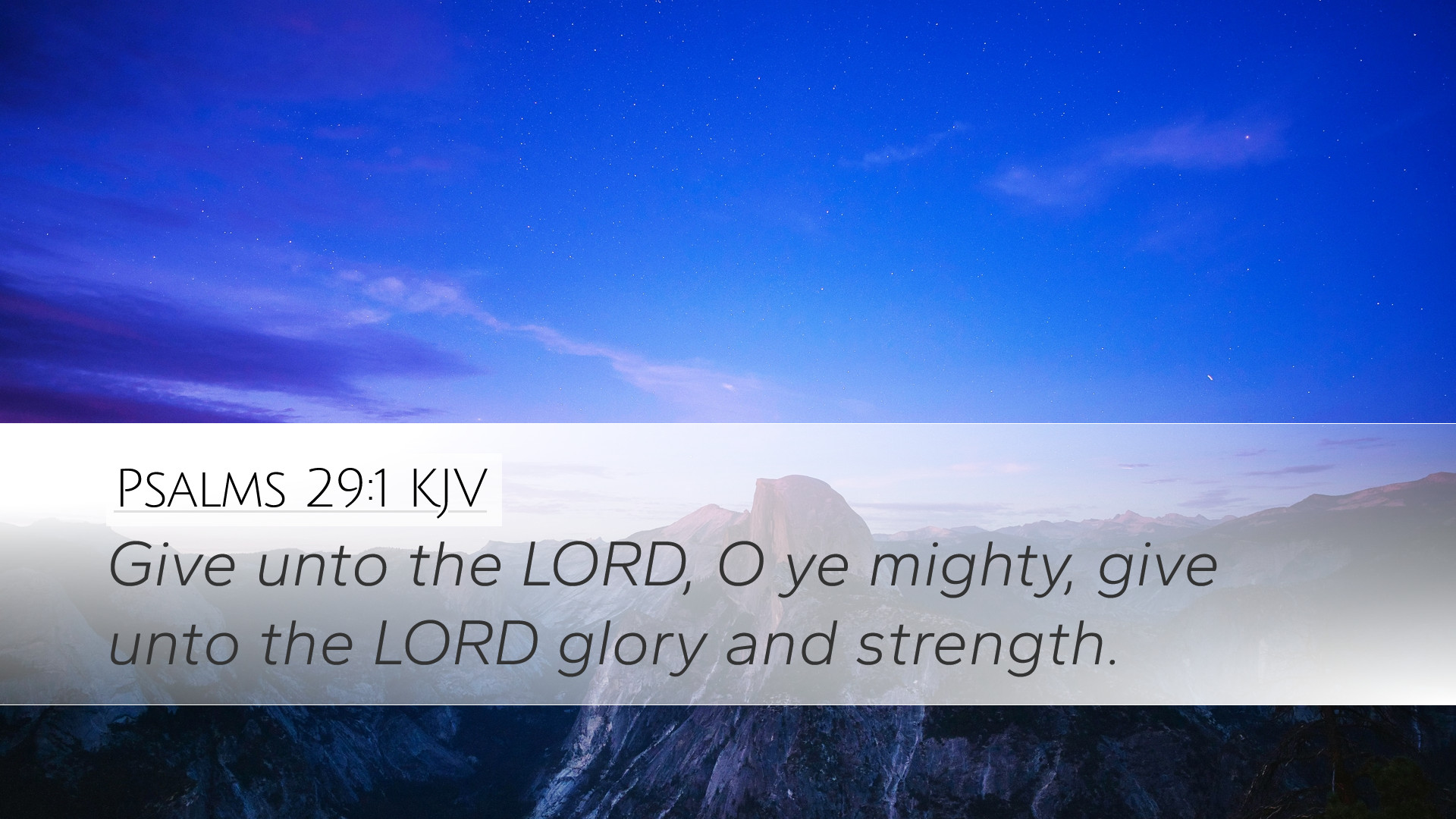Commentary on Psalms 29:1
Verse: "Ascribe to the LORD, O heavenly beings, ascribe to the LORD glory and strength."
Introduction
The verse from Psalms 29:1 serves as a powerful call to worship the Lord, inviting both celestial and earthly beings to recognize and proclaim the omnipotence, glory, and strength of God. This verse sets the stage for the subsequent verses that describe the grandeur of God's voice and His supreme authority over creation.
Insights from Public Domain Commentaries
Matthew Henry
Matthew Henry emphasizes the aspect of ascribing glory to God as a vital act of worship. He states that praising God is not merely an activity but a duty of all created beings. The term "heavenly beings" refers ostensibly to angels and possibly implies the broader heavenly host, which aligns with the scriptural encouragement for the entire creation to acknowledge God's majesty.
- Recognition of God's Authority: Henry notes that ascribing glory entails recognizing God's authority over all creation. He encourages believers to acknowledge God's sovereign power, reminding us that it stems from His eternal existence and creative ability.
- Call to All Creation: The call in this verse is not limited to humans; it encompasses all beings in heaven, holding them accountable for their response to God's glory. Henry implies that failure to recognize God's greatness is a significant oversight.
Albert Barnes
Albert Barnes provides a detailed analysis of the term "ascribe." He suggests that this action is not only an acknowledgment but also a declaration that God is worthy of glory and strength. Barnes interprets this verse as an invitation to the angels and heavenly spirits to join in the praise of God, indicating the communal nature of worship in the heavenly realms.
- Spiritual Worship: Barnes highlights that true worship involves both spirit and truth. The heavenly beings, equipped with knowledge and understanding, are more than capable of recognizing the God’s inherent glory.
- Attributes of God: According to Barnes, this verse succinctly encapsulates two primary attributes of God—His glory (the manifestation of His holiness and majesty) and His strength (implying omnipotence and sovereignty). The ascription is a reflection of both these attributes to His nature.
Adam Clarke
Adam Clarke offers a robust contextual analysis, diving deep into the cultural and historical background of the psalmist's audience. Clarke notes that in the ancient Near Eastern context, the idea of giving credit to deities is customary; however, this psalm uniquely directs that honor to the one true God.
- Contrasting Idolatry: Clarke delineates the significance of this verse amidst a culture steeped in idolatry, where lesser gods were often exalted. In urging ascription towards Yahweh, there is a clear and deliberate separation from the worship of false gods.
- Worship as a Community Act: Clarke asserts that this call to worship signifies the unity among the heavenly beings in acknowledging God's power. He suggests that communal worship, as exemplified in this psalm, should inspire the same in earthly worshippers.
Theological Implications
The theological implications of Psalm 29:1 extend deep into the doctrines of worship and God's nature. It establishes a framework for understanding worship as fundamentally recognizing and responding to God's unique attributes.
Worship as a Response to Revelation
Worship is portrayed as a natural and necessary response to the revelation of God's glory and power. The existence of God and His mighty works compel acknowledgment and praise, positioning worship not as an obligation but as an organic reaction of the heart.
The Universality of Worship
Psalms 29:1 suggests a universal call for worship that resonates across different dimensions of creation. Whether heavenly beings or earthly creatures, all are invited to praise God, emphasizing the wholesomeness of His authority and the necessity for acknowledgement in human consciousness.
Conclusion
In summary, Psalms 29:1 serves as a profound call to worship that transcends individual and cultural boundaries. Matthew Henry, Albert Barnes, and Adam Clarke collectively elucidate the verse's profound meaning—an invitation for all beings to recognize and proclaim the majesty of God. This act of ascription not only reinforces the nature of God’s glorious attributes but also serves as a rallying cry for the faithful, urging them toward a lifestyle of worship that reverberates throughout creation.


